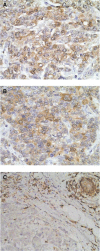Elevated protein kinase C alpha expression may be predictive of tamoxifen treatment failure
- PMID: 12778068
- PMCID: PMC2741052
- DOI: 10.1038/sj.bjc.6600923
Elevated protein kinase C alpha expression may be predictive of tamoxifen treatment failure
Abstract
We previously reported that stable transfection of protein kinase C alpha (PKCalpha) into T47D human breast cancer cells results in tamoxifen (TAM)-resistant tumour growth. Relevance of PKCalpha expression in clinical specimens was determined by comparing PKCalpha expression in tumours from patients exhibiting disease recurrence with patients remaining disease-free following TAM treatment. Our results suggest that PKCalpha expression may predict TAM treatment failure.
Figures
Similar articles
-
Overexpression of PKCalpha is required to impart estradiol inhibition and tamoxifen-resistance in a T47D human breast cancer tumor model.Carcinogenesis. 2006 Aug;27(8):1538-46. doi: 10.1093/carcin/bgl002. Epub 2006 Mar 2. Carcinogenesis. 2006. PMID: 16513679
-
Protein Kinase C alpha is a marker for antiestrogen resistance and is involved in the growth of tamoxifen resistant human breast cancer cells.Breast Cancer Res Treat. 2007 Aug;104(2):165-79. doi: 10.1007/s10549-006-9399-1. Epub 2006 Oct 24. Breast Cancer Res Treat. 2007. PMID: 17061041
-
Adjuvant sequencing of tamoxifen and anastrozole is superior to tamoxifen alone in postmenopausal women with low proliferating breast cancer.Clin Cancer Res. 2011 Dec 15;17(24):7828-34. doi: 10.1158/1078-0432.CCR-11-1846. Epub 2011 Oct 13. Clin Cancer Res. 2011. PMID: 21998336
-
Measuring IGF-1, ER-α and EGFR expression can predict tamoxifen-resistance in ER-positive breast cancer.Anticancer Res. 2011 Jan;31(1):23-32. Anticancer Res. 2011. PMID: 21273576
-
Hypoxia inducible factor-1alpha is a prognostic marker in premenopausal patients with intermediate to highly differentiated breast cancer but not a predictive marker for tamoxifen response.Int J Cancer. 2006 May 15;118(10):2609-16. doi: 10.1002/ijc.21676. Int J Cancer. 2006. PMID: 16381002
Cited by
-
Minireview: Inflammation: an instigator of more aggressive estrogen receptor (ER) positive breast cancers.Mol Endocrinol. 2012 Mar;26(3):360-71. doi: 10.1210/me.2011-1302. Epub 2012 Feb 2. Mol Endocrinol. 2012. PMID: 22301780 Free PMC article. Review.
-
PKCα Attenuates Jagged-1-Mediated Notch Signaling in ErbB-2-Positive Breast Cancer to Reverse Trastuzumab Resistance.Clin Cancer Res. 2016 Jan 1;22(1):175-86. doi: 10.1158/1078-0432.CCR-15-0179. Epub 2015 Sep 8. Clin Cancer Res. 2016. PMID: 26350262 Free PMC article.
-
Estradiol-induced regression in T47D:A18/PKCalpha tumors requires the estrogen receptor and interaction with the extracellular matrix.Mol Cancer Res. 2009 Apr;7(4):498-510. doi: 10.1158/1541-7786.MCR-08-0415. Mol Cancer Res. 2009. PMID: 19372579 Free PMC article.
-
Sustained inhibition of PKCα reduces intravasation and lung seeding during mammary tumor metastasis in an in vivo mouse model.Oncogene. 2011 Jan 20;30(3):323-33. doi: 10.1038/onc.2010.415. Epub 2010 Sep 20. Oncogene. 2011. PMID: 20856202 Free PMC article.
-
Aberrant phosphorylation inactivates Numb in breast cancer causing expansion of the stem cell pool.J Cell Biol. 2022 Dec 5;221(12):e202112001. doi: 10.1083/jcb.202112001. Epub 2022 Oct 6. J Cell Biol. 2022. PMID: 36200956 Free PMC article.
References
-
- Borner C, Wyss R, Regazzi R, Eppenberger U, Fabbro D (1987) Immunological quantitation of phospholipid/Ca2+-dependent protein kinase of human mammary carcinoma cells: inverse relationship to estrogen receptors. Int J Cancer 40: 344–348 - PubMed
-
- Brunner N, Spang-Thomsen M, Cullen K (1996) The T61 human breast cancer xenograft: an experimental model of estrogen therapy of breast cancer. Breast Cancer Res Treat 39: 87–92 - PubMed
-
- Chisamore MJ, Ahmed Y, Bentrem DJ, Jordan VC, Tonetti DA (2001) Novel antitumor effect of estradiol in athymic mice injected with a T47d breast cancer cell line overexpressing protein kinase c alpha. Clin Cancer Res 7: 3156–3165 - PubMed
-
- Dumont JA, Bitonti AJ, Wallace CD, Baumann RJ, Cashman EA, Cross-Doersen DE (1996) Progression of MCF-7 breast cancer cells to antiestrogen-resistant phenotype is accompanied by elevated levels of AP-1 DNA-binding activity. Cell Growth Differ 7: 351–359 - PubMed
-
- Fernandez P, Wilson C, Hoivik D, Safe SH (1998) Altered phenotypic characteristics of T47D human breast cancer cells after prolonged growth in estrogen-deficient medium. Cell Biol Int 22: 623–633 - PubMed
Publication types
MeSH terms
Substances
Grants and funding
LinkOut - more resources
Full Text Sources
Other Literature Sources
Medical
Miscellaneous


